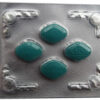Medication Overview
Viagra, or sildenafil citrate, is a prescription drug primarily used to treat erectile dysfunction (ED). It operates by enhancing blood flow to the penis, facilitating the achievement and maintenance of an erection in response to sexual stimulation. Developed by Pfizer, this medication belongs to a group of drugs called phosphodiesterase type 5 (PDE5) inhibitors. It is available in oral tablet form typically in doses of 25 mg, 50 mg, and 100 mg. Effects generally commence within 30 to 60 minutes post-ingestion and can last up to four hours.
Mechanism of Action
Viagra functions by inhibiting the PDE5 enzyme in the smooth muscle cells of the penis. By blocking PDE5, the medication prevents the breakdown of cyclic guanosine monophosphate (cGMP), a molecule instrumental in inducing smooth muscle relaxation. This relaxation leads to increased blood flow into the penis, promoting an erection in the presence of sexual stimulation. Critically, viagra requires sexual arousal to initiate its effects; it does not induce spontaneous erections.
Administration Guidelines
Viagra should be ingested approximately one hour before planned sexual activity, though it can be consumed anywhere from 30 minutes to four hours in advance. The recommended starting dose is 50 mg, subject to adjustment based on efficacy and individual tolerance. Patients should not exceed one dose per day. It can be taken with or without food; however, consuming a high-fat meal prior to taking Viagra may delay its onset of action. Patients should adhere to their healthcare provider’s dosing instructions strictly.
Potential Side Effects
The most common side effects associated with Viagra use include headaches, facial flushing, and digestive disturbances such as indigestion or heartburn. Users may also experience a temporary visual disturbance, such as a blue-tinted vision or increased light sensitivity. Less frequently, patients might encounter nasal congestion or dizziness. While these side effects are typically mild and transient, individuals with persistent or severe symptoms should seek medical advice promptly.
Drug Interactions
Viagra can interact with several medications, leading to potentially adverse effects. Drugs that may potentiate adverse reactions include nitrates used for chest pain and guanylate cyclase stimulators like riociguat. Co-administration can result in a significant drop in blood pressure, posing serious health risks. Furthermore, other PDE5 inhibitors or medications used for pulmonary arterial hypertension can compound this effect. Patients should inform their healthcare provider of all concurrent medications to mitigate interaction risks.
Contraindications
Viagra is not recommended for individuals with certain underlying health conditions. These include severe cardiovascular disorders, recent history of heart attack or stroke, and hereditary degenerative retinal disorders. Patients with severe liver impairment or conditions such as Peyronie’s disease should use Viagra cautiously, under medical supervision. Additionally, individuals who are allergic to sildenafil or any other ingredient in the formulation should avoid using the drug altogether.
Storage Requirements
Viagra should be stored at room temperature, between 20°C and 25°C (68°F and 77°F), in its original packaging to protect from moisture. It is essential to keep the medication out of reach of children and pets. If the medication has expired or is no longer needed, patients should properly dispose of it and seek guidance from a pharmacist or local waste disposal company to avoid environmental contamination.
Prescribing Considerations
Before prescribing Viagra, healthcare providers must assess an individual’s overall health and suitability for treatment, including cardiovascular status and potential risk factors for ED. A comprehensive evaluation may include assessing psychological, hormonal, and lifestyle factors contributing to erectile dysfunction. Providers should engage in open discussions with patients to address any concerns and set realistic expectations regarding treatment outcomes. This ensures an informed decision-making process tailored to the patient’s needs and medical history.
Physiological Review
Understanding the physiological requirement for an erection helps clarify Viagra’s role. For an erection to occur, the penile arteries must dilate, and smooth muscles in the erectile tissue must relax, both processes driven by nitric oxide release upon sexual arousal. This triggers increased blood flow into the penis, engorging it and compressing surrounding veins, resulting in maintained rigidity. Viagra assists by sustaining the effects of nitric oxide through PDE5 inhibition, primarily amplifying natural physiological processes rather than initiating them independently.
Monitoring Treatment Response
Patient response to Viagra should be closely monitored to determine the medication’s efficacy and tolerance. Healthcare providers may consider adjusting dosages based on these observations, increasing to a maximum of 100 mg or reducing as low as 25 mg if side effects are burdensome. Continuous assessment allows healthcare providers to optimize treatment, addressing any issues like insufficient response or adverse reactions promptly. Encouraging open communication ensures timely management, improving patient satisfaction and outcome.
Preparedness for Adverse Reactions
Though rare, Viagra can cause serious adverse effects like priapism, a prolonged and painful erection exceeding four hours, requiring immediate medical attention to prevent long-term damage. Sudden vision or hearing loss mandates discontinuation of the drug and prompt medical consultation. Patients must be aware of these risks and advised to seek emergency care if necessary. Pharmaceutical vigilance ensures early identification and management of any adverse reaction, safeguarding long-term health and medication efficacy.






Reviews
There are no reviews yet.